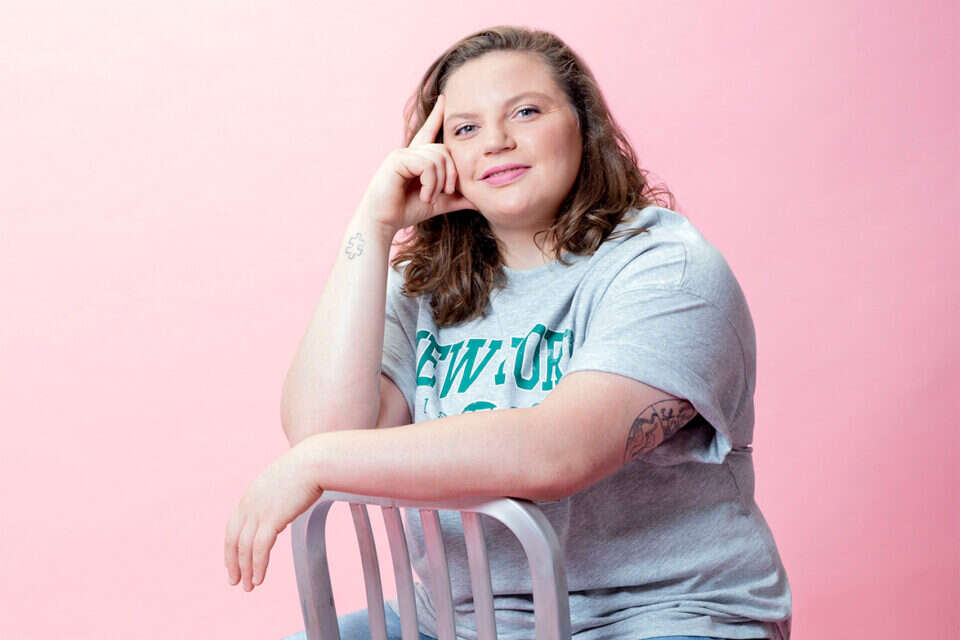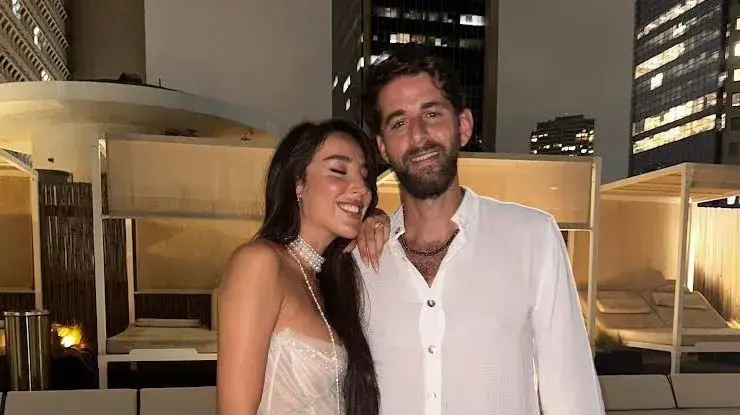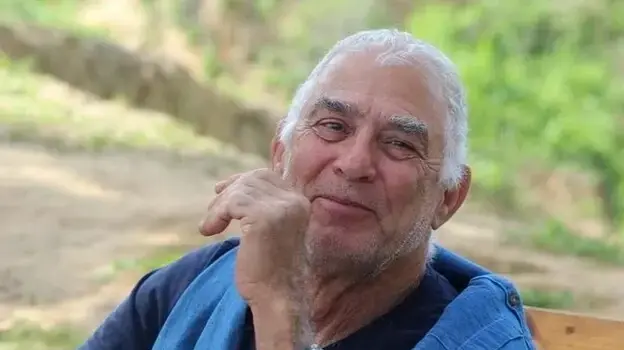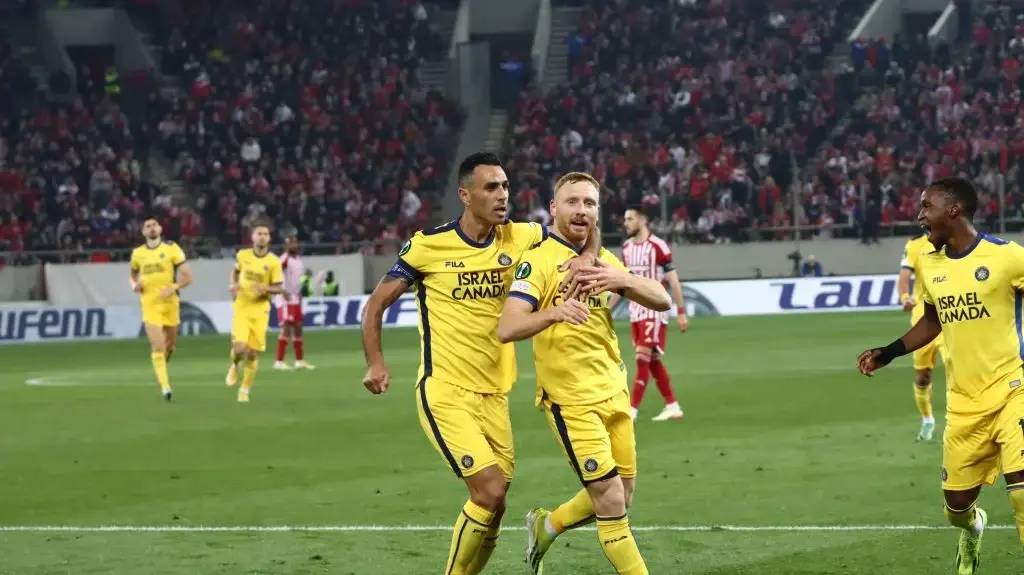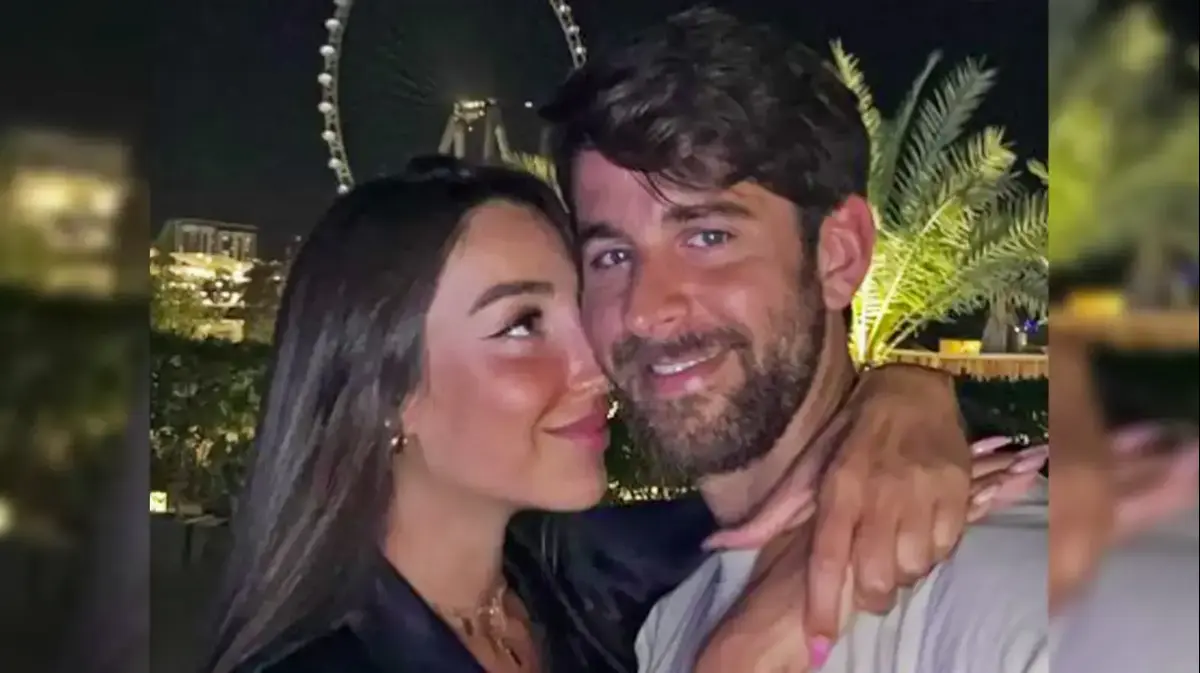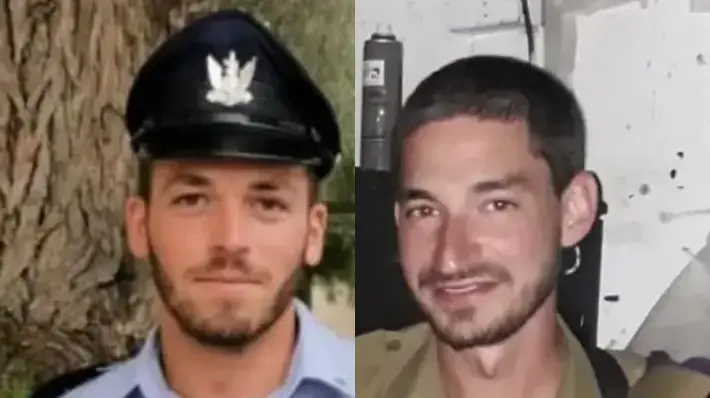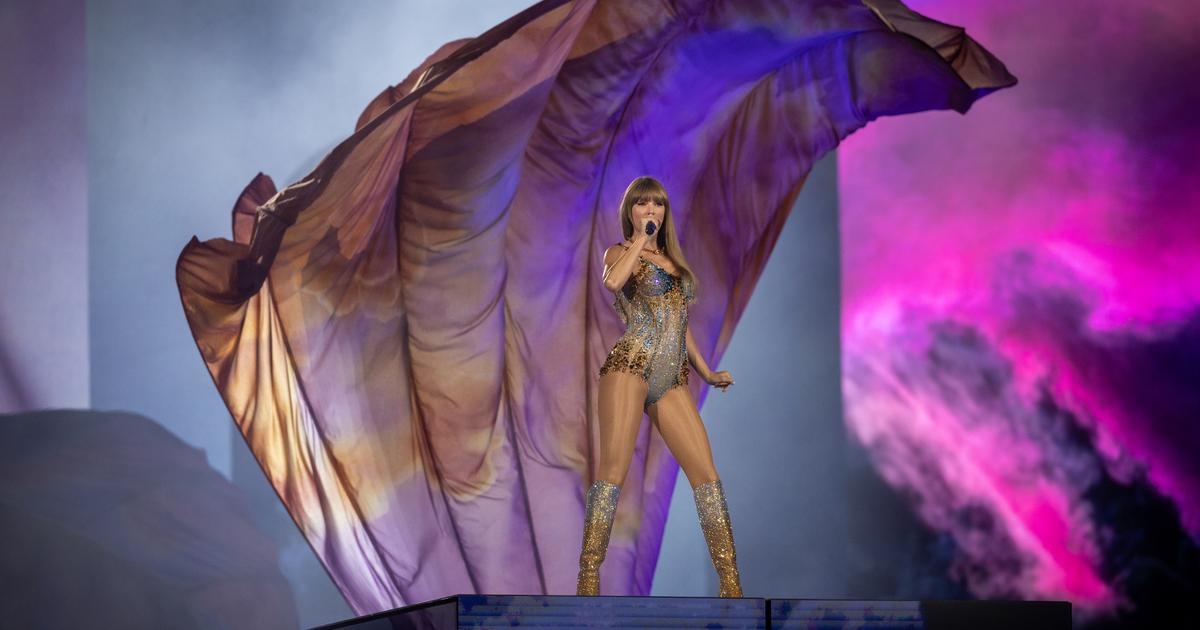The bronze medal worn by Raz Hershko around her neck, at the end of the judo team competition at the Tokyo Olympics, was for her much more than a sports medal. For her, for the stigmas she had fought for years, for the self-flagellation, and it was the sweetest victory she could have asked for, on the most glittering stage in the world.
"In my youth, I was sexually assaulted, like many women in Israel," she reveals at the beginning of the conversation.
"Beyond that, I was exposed to student ridicule, my self-confidence was low, and all in all it put me in a very bad state of mind. I didn't like to turn to people for help, and that's how I started hurting myself in 11th grade.
It helped me bring out what was inside, because it is much easier to deal with external pain than with internal pain.
"In 2016, I enlisted in the IDF as an outstanding athlete.
I arrived at Camp 80. I served there as a company clerk.
Then I had a severe family crisis, which led to a mental breakdown.
I only went to judo training, I could not do anything beyond that.
"My coaches initially thought I had a physical problem, but realized very quickly that it was on a mental background. I was a loop that could not be gotten out of, I was not me. But I was referred to a clinical psychologist, who gave me tools to get out of self-harm and see the world differently. myself.
"I went through a process with her, and after two years we came to a common decision that I am in a much better place, and that I no longer need the treatment. Today I am whole with myself, and feel I have the right tools to deal with life. I am a completely optimistic person, much more than I was. Loves life, knows what's next, and mostly understands that not everything is terrible and horrible. "
What did you think of Simon Bailes' decision to retire from almost all Olympics competitions because of the mental strain?
"A very brave decision in my eyes. True, this is the big stage, and athletes need to know how to deal with such situations, but as someone who has experienced anxieties and things like that, I say that if she came to a choice between two choices - move on for the whole world and prove her best, Or choose her health, knowing that if she continues she may reach a state from which there may be no way back - well she has chosen for herself.
"Bottom line, well done to her. In the end she came up like a giant for the beam exercise and won a medal, and that's the biggest win. There's a lot of criticism that she was wrong because it's the Olympics, but no one can say that as long as he was not in shoes. Of that person. "
• • •
Hershko reached her first Olympics in 16th place among the open weight competitors of 78 kg and over. She started with a victory in the iPhone after 42 seconds over Tahani Alktani of Saudi Arabia, who finally agreed to shake her hand. In the next battle, in the quarterfinals, she lost in the iPhone Lakira the Japanese Sunna, a minute before the end.
Were you able to sleep the night before the competition?
"I did not sleep well, there was stress."
And what did you say to yourself in the morning?
"That I'm going to do my best, no matter who or what. I prepared for whatever would come."
Then you go up against the Saudi judoka.
"Yes. We got the lotteries a week before the competition, and we did not know if she would go up or not. Our Japanese, Mickey Tanaka, and Coach Ido Bar informed me that Saudi Arabia was on the rise, and that we needed to prepare for it.
"I defeated her with a relatively fast iPhone, and that boosted my confidence. I felt good in the first fight, it was a strong fight that put me well into the competition."
And at the end you approach her and reach out to her.
"It was fun, exciting. We shook hands, and did not run away from each other. Politics remained off the mat. We could engage in what we wanted and loved, in what we came to do, and there was a fair fight."
Then came the Japanese, who was a favorite and also enjoyed a home-court advantage.
"She was one of the gold nominees, and she really won in the end. I did a good fight against her, I fought to the end. After she knocked me down, when I was on the floor, I cried. I wanted to stop crying, but I couldn't stop. It was really crying with a voice, I choked.
"The coach, Shani (Raz 'uncle; Shaz), hugged me and said he was proud of me and that it was a good campaign, that I was here by right and not by grace, and that we needed to look ahead."
Then you came back to this battle in your head?
"A lot of times. I kept thinking about what I would have done differently. But it just shows that I have more to work on and improve, and that next time I will beat it. No need to wait three years, maybe it will happen at the World Championships next year."
All Israeli judokas have had a disappointing experience in personal battles, and talk of failure has already begun. Were you down?
"Everyone and his feelings. I think as a team we were a good team, no one gave up even for a second. We all fought to the end, and everyone gave their all. But in achievement sports, as in achievement sports, it all depends on one given day, and probably no question. There were our days.
"The professional team lifted us up, the whole team, and prepared us for the team competition, which took place for the first time at the Olympics. The coaches wanted us to come to this competition most prepared and purposeful, to explode on the mat and bring the medal. We were all told painful and disappointing losses. One, as a team, and if everyone gives their heart to the end - we will make history. "
"I gave my all. This is Raz the warrior, I did not give up for a second."
Battle of Tokyo, Photo: Reuters
• • •
On July 31, the team advanced to the team competition.
The first team it met was Italy, in moving film battles, men and women alternately, with the weights not always matching each other.
Hershko went up to the mat against Alice Blendi, with the team trailing 3: 2, and its loss would have given Italy the victory.
"It was a very different battle from anything I had done until then," she recalls.
"The Italian was also very careful and waited. She knew what moves I usually make. She was also light, because her weight is up to 70 kg, so the fight was a bit more rhythmic, not something I am used to in my weight.
I kept trying not to let her initiate and chase after her.
"The fight was very close. She took two penalties out of me (a third penalty causes a loss), and we got to a gold score. I remember Shani yelling at me, 'You're not going to lose this fight, now you're hugging her!'
"As soon as I came to catch her, she made a mistake, and I overthrew her in Vazari."
Israel equalized the result against Italy to 3: 3.
In the decisive battle, at the weight determined in the lottery, Gili Sharir and Maria Chantrachio - who had only competed against each other a few minutes before, and Sharir won in the iPhone.
This time, too, Sharir won, and Israel advanced to the next stage.
The next rival was the formidable France, and this time too there was a fascinating sporting drama.
Hershko went on the mat when Israel had a 3: 1 advantage and could close the deal, but lost to new Olympic medalist Roman Dicko, and the French shrank the result.
"Dicko is a European champion, I think she's in the top 3 of the weight," says Hershko.
"I never competed against her, it was the first time, and it stressed me out, but I said, I have nothing to lose, I will give it my all. There were some attacks I threatened her and she was afraid, but in the end she took two penalties out of me, knocked me down in the vazari and won. My loss, it was a good fight for me. "
It was followed by Uri Sasson, who lost to Teddy Riner, as in the individual competition.
Gili Sharir rose to the decisive battle again, facing Margo Pino - whom she won in the early battle.
This time, Pino managed to defeat Sharir on an iPhone, and Israel moved on to fight for the bronze medal through the House of Consolation.
The next team in line was Brazil.
Hershko went up to face Meira Aguiar, with the result 2: 1 to Israel.
"This Brazilian weighs 78 kilos, and I was supposed to beat her. I did not feel she was so strong physically, but unfortunately she was very experienced and knew what to do. She was really waiting for my mistakes, and just grabbed me by the iPhone."
After the loss, Peter Plachik went on the mat and Nelson Levy will refrain.
Both defeated their rivals, sending Israel into the direct battle for bronze against powerful Russia.
Despite the joy of victory, Hershko found it difficult to console herself following her two consecutive losses.
"After the fight with the Frenchwoman I was in Bassa, but after the Brazilian I had a crazy fall. There was also a relatively long break until the next fights, and there was just a drop of tension. Our Japanese coach, Mickey, came and encouraged me. She told me, 'Need to get up, this is the last fight "I heard it, but I was still a little focused on myself. I took off my bandages, changed into my usual clothes, and we went to eat together, the whole team."
In these dramatic moments are you talking to each other?
"Yes, we lift each other up. Our training room was in a hurry, we were very purposeful. We really wanted it, we only thought about the victory and what we could do. Everyone wanted to come up and participate.
"Shani took me for a call before the warm-up and told me that he believed in me. He gave me the feeling that I could and was strong, and that he believed that I would dismantle Russia.
"When I did the warm-up I was under a lot of pressure. I felt like I did not feel like it and I wanted to compete, and my stomach ached from too much pressure, I felt it burning. I wanted so much and so I did not want to go into battle, Faster".
Hershko faced Alexandra in Bintseva, in a 1-1 draw between the teams.
She performed two amazing vasari within 45 seconds, which gave her the win.
It was followed by Plachik and Nelson Levy, who also won and set an amazing 4: 1 for Israel - and a historic bronze medal.
"We celebrated like crazy, we just screamed," Hershko says with sparkling eyes.
"We had no words, so everything just came out with crazy roars and jumps. Shani told us he was proud of us, that we did something historic. Everyone saw we were a strong and powerful team. We showed everyone who we are, and we'll prove we are not on, we are face forward."
"The coaches wanted us to come to this competition the most prepared and purposeful, to explode on the mat."
Hershko (right) with her members of the judo team after winning the bronze, Photo: Reuters
Is there anything you would have done differently at the Olympics?
"I think I gave my all. This is the warrior Raz, I did not give up for a second. This was my first Olympics, I tasted the experience and came back with a medal. It is not the same as in the individual competition, but still it was a lot of fun."
How was the Olympic experience for you?
"Exciting. There were a lot of people in the village, we met athletes and said hello. There was a dining room, where everyone met and ate. Everyone was wearing masks, and maybe there were fewer parties than usual.
"All the judokas were in the apartment: Timna, Gili, Inbar, Shira, Gili Cohen and I, a couple in every room. I was with Timna in the room, but each time we changed beds. There were musical chairs."
Gili Cohen, who is not a partner in the group competition, did not receive a medal.
"In the group competition it was allowed to register two people of each weight. They could not register her, because in the individual competition she was injured in the elbow. They had to register someone weighing 57 kg, who could replace Timna if she was injured, and it was decided not to endanger Gili and register Shira. .
"It's a shame, but Gili is part of the team and part of this huge achievement. She is really the heart of the team. Just as it would not have happened without me, so it would be without her. We are all one team, and we are together in it."
They say you did a tattoo of the Olympic emblem, is that right?
"I have seven tattoos, including a week-old fresh tattoo I did after I came back from Tokyo. I did not want a routine tattoo because I am not a routine person. I wanted it to be something that is beyond the Olympic rings, so the background around is Mount Fuji and the blossom, and there are the rings. For me, the tattoo symbolizes not only the participation in the Olympics, but the unusual. "
• • •
She lives in a caravan at the Wingate Institute, and alternates with her parents in Netanya.
A native of the city, the youngest daughter of Lilach and Itzik, who met in the second chapter of their lives.
Lilach came to the second marriage with one son, Itzik came with three.
In 1998, they gave birth to Raz - an only child after four sons.
The road to judo was almost paved for her.
Shani Hershko, the mother of the mother Lilach ("Mother left her original last name to herself and to me"), founded the Meitav Netanya Judo Club in 1991 (where Jordan Jerby also grew up).
The little niece joined the club at the age of four.
"I was a hyperactive girl," she says.
"My parents told me that in the garden, while other girls were swinging, I would move protrusions from side to side. They enrolled me in many classes: basketball, ground gymnastics, dance and judo.
"At first judo felt like a game to me. I learned the basic exercises, met friends and had fun. Over the years I left most classes, staying only in judo and basketball. By the way, all my cousins were in the judo class, but I was the only one left. In seventh grade, I had to make a decision between judo and basketball, and I chose judo. "
Were there more girls in the industry?
"I don't remember anyone significant. I was a chubby girl, so there were never girls of my weight who I trained and competed against. I competed against lower weight girls or boys.
"Every morning of a competition I would cry because I had to be weighed and I didn't want to. Because of my weight, many times in the end I competed in front of boys. My mother always said to me, 'Everything is fine, this is who you are, you have nothing to be ashamed of,' but I felt different. It was not pleasant, but I did not try to change.
"Indeed, there were Arabs who I returned from class or from a social gathering and did not eat dinner, because they got down on me or threw 'look what she looks like.' There were a lot of teasing. Children would call me Abu-Gavr.
Did it hurt you?
"There were times it really hurt me, but I kept going. Sometimes I would tell my mom because she suspected it was happening and pressured me to tell. In general, I was not the ultimate daughter and I didn't get along with girls. We did not have the same interests. I did not dress feminine, no I put on blush, nail polish or earrings. I was 'Tom Boy'. "
Want to change something yourself?
"What am I going to change? This is who I am, and this is what I love to do. But it got me into a bass. On the one hand, judo is what I love. On the other hand, they get down on me.
"I didn't have that many friends in the division, but I eventually grew up with it. In 10th grade, when I was already good at judo, I moved to a boarding school at the Wingate Institute and found a supportive and loving environment where everyone is an athlete. I had friends from all industries and ages "Everything from everything. Then the teasing ended."
Do you love your body today? Shlomo with him?
"I'm still not one hundred percent complete with him, but is there anyone who is one hundred percent complete with his body? There is no such thing. Bar Refaeli also doesn't think she's perfect. I'm sure I'm more complete than I was, but there are still moments when I look at myself in pictures and say 'Wow, how fat I was.'
"Some fashion stores have clothes that I do not like, so I go to the men's department. It sucks sometimes with shopping with family and friends, because we split up and each goes to a different side. In the end I find the things I like, that make me who I am, and then all the non- Integrity that I feel disappears, and I become whole. "
How do you feel in front of cameras?
"I'm very shy. Sometimes there are poses where I get a double chin, and because of my stomach I prefer to be photographed only from the chest up, so they don't see the whole middle. I wear glasses because I have a lazy eye, so there is always one more closed eye in pictures.
"I don't have many pictures from childhood. From a certain age I stopped taking pictures. When I was a baby my mother took pictures of me, and I was not aware of it. She also forced me to wear dresses. But at some point, when there was a family photo and I was asked to join, I refused. I would hide behind my mother's leg. "That's why I have almost no pictures from the age of 6 to the division, and from high school I have a few pictures. Even my book from the bat mitzvah is hidden somewhere."
"Today I am at peace with myself, feeling I have the tools to deal."
With the Olympic medal, Photo: Kfir Ziv
The day you leave the sport, do you want to change something in your body?
"It's my body, it's what it is. I do not think I will make a drastic change, I will not gain madness and I will not pack madly. I will continue to maintain a sporty lifestyle, I will not degenerate.
"Now that I'm open weight (with no weight limit), I sometimes allow myself a little more, but I do not want to be just fat percentage. We try to make all fat percentage muscle, to become strong. In Tokyo I kept weighing between 100 and 101. kilo.
"I work with the team's nutritionist, Mickey Madar, and I have a regular menu. But I can call him at any hour and say, 'Listen, is there any pasta here, can I eat it?', And he will tell me whether or not. The balance. This one, between eating healthy and unhealthy, is perfect for me.Don't just want to eat healthy.I come from a home that does not eat healthy.
"We love celebrations with food and carnivals, so I love everything - pastas, sushi, everything. We all really like to entertain, so at Friday dinner there are always more people besides the family, and there is always lots of varied food on the table, and in quantities. To friends and neighbors. "
• • •
Her progress in the judo world was rapid.
"At the age of 14 and a half, I won the Israeli championship for the first time for graduates, and then I knew I had something in me," she says.
"I was added to the team, and I started training with them and flying to competitions abroad.
I came to an understanding with myself that this is what I want to do. "
With a last name like Hershko in the judo industry, it must have been more complex.
"Everyone knows we're family. A lot of people think Shani is my father, but he's my uncle, and that's it. No matter what they say - he's the coach and I'm the apprentice. I'm no different from any other athlete. Shani is an amazing coach, but I made my achievements .
"I work hard like everyone else and do not get preferential treatment. If I have to get a shock when I do something bad, I get. Sometimes I get more shouting and he's tougher with me, and I live with it, it's okay. He shouts and hugs too, like all "A tough coach with high standards of Olympic medalists. He does not just have a lot of achievements."
"There is no preferential treatment."
With coach and uncle Shani Hershko,
Already in the first international competition in which she participated, the European Cadet Cup in 2013 in Zagreb, the 15-year-old Hershko reached the semi-finals, but lost.
Then she also lost the battle for the bronze medal, but did not break.
"I looked at Jordan Jerby, who was totally my role model. She was already a crazy athlete, and I started striving to get there. I would look at the training of the judokas, among them were Gili Cohen and Shira Rishoni, who are now members of my team.
"In 2015 I had a difficult year, I was injured a lot and still not strong enough, I did not have much muscle. I barely competed that year. Then Shani decided to give me the chance of a lifetime and fly me to the European Under-18 Championships in Sofia. I came anonymously, No one knew me - and boom, I won.
"I did not know my soul from happiness. Beyond the gold medal, the flag that was raised and the anthem, it was crazy. The first time an Israeli won the European Championship. To the lower tier), and I defeated all the whites.
"A month and a half later, the European Youth Games were held in Tbilisi, and they already knew me there. I lived up to expectations and reached the final, but unfortunately I only won a silver medal."
Like many athletes, her head was not exactly in school.
"The teachers at Hof Hasharon High School, where the outstanding athletes from Wingate study, told me that I was charming, cute and sweet, but interrupted in classes and talked endlessly," she smiles.
"What to do that I could not sit in class and that I like to make laughs? I did not have much self-confidence, I was shy, and it took me a while to open up, so I was a combination - introverted and noisy. Such a dissonance.
"It wasn't until 11th grade that I was diagnosed with ADHD, so I started taking concert pills.
I did not want to take pills, because I did not want anything to control me, but when I saw that matriculation was approaching - and that was something that was important to me - I said, 'Well, I'll take the important tests and that's it.
And I really haven't taken any more since. "
Did the teachers consider you?
"Very. They always tried to be flexible with me with the hours of the classes and the exam dates. They knew that judo is for me in the first place, where I want to be."
• • •
גם אחרי שעברה להתחרות בבוגרים המשיכה הרשקו לרשום ניצחונות מרשימים. בגראנד פרי של מונטריאול ב־2019 היא זכתה במדליית כסף, אבל באליפות העולם בטוקיו, מאוחר יותר באותה שנה, הפסידה כבר בסיבוב הראשון.
"ההפסד שם היה שוק עבורי, ואז נגמרה העונה בגלל הקורונה. עוד הייתי אמורה לטוס לסבב אחרון של תחרויות, כדי לעשות את הקריטריון לאולימפיאדת טוקיו. העולם נעצר כשהייתי על הקשקש, והתחלתי כבר לחשוב על פריז 2024".
כשאיגוד הג'ודו העולמי הודיע על ביטול כל התחרויות ב־2020, התחילו בווינגייט בתוכנית אימונים מותאמת קורונה. "יומיים או שלושה לפני הסגר הראשון, שני הרגיש שזה מגיע וחילק אותנו לקפסולות של זוגות או שלישיות. אני הייתי אחת משלישייה. כל קבוצה קיבלה ציוד משלה לאימונים: מוטות, חבלים, גומיות, מזרנים. התוכנית כללה אימון עם מאמן, שהיה בא בכל פעם לקפסולה אחרת, וגם אימונים משותפים בזום. ככה גם שמרנו על כושר, וגם הקפדנו על הפרדה הרמטית.
"כשהודיעו שהאולימפיאדה נדחתה בשנה, זה היה טוב לי. אבל לא ידענו בדיוק מה יקרה מבחינת ניקוד, והמשכנו להתאמן כאילו יש תחרויות בקרוב. אני סבלתי מפציעה במרפק שמאל שכאבה לי מאוד.
"בנובמבר 2020 עשיתי ניתוח במרפק. אחרי ארבעה חודשים כבר התחריתי בגראנד סלאם בתל אביב. היה לי רצף טוב של תחרויות, כולל מדליית זהב בגראנד סלאם אנטליה באפריל האחרון, שהבטיחה לי את המקום בטוקיו.
"לפני התחרות הזאת אמרתי לעצמי, 'רז, רק זהב' - ונשבעתי שאקפוץ לבריכה אם אזכה. חזרתי מהתחרות לבדיקת קורונה, ואחריה קפצתי לבריכה באנטליה. יש תיעוד של הקפיצה. היה שם קפוא מוות".
• • •
עכשיו היא קיבלה, כמו כל חבריה לנבחרת הג'ודו, 50 אלף שקלים עבור המדליה. זה שנים שהיא נעזרת במלגות מטעם עיריית נתניה, מועדון הבית שלה, מיטב נתניה ואיגוד הג'ודו. כרגע היא מצויה במסע לחתימת חוזים עם ספונסרים שיתמכו בה בדרך לפריז 2024.
"איגוד הג'ודו ופרויקט אתנה עוזרים לנו מאוד. באיזשהו שלב גם המשפחה עזרה, אבל כשמתחילים להביא תוצאות, האיגוד עוזר יותר".
ההורים טסים איתך?
"לא. משפחה בצד וג'ודו בצד. הם לא באים לחו"ל, רק לתחרויות בארץ. הם שומרים מרחק ולא מתערבים לי בכלום, רק נותנים לי תמיכה אחרי אימונים ותחרויות".
מה מאפיין את הג'ודו שלך?
"אני עושה הכל בג'ודו. אני ימנית שעושה גם שמאל, עושה ברכיים, עמידה. אין לי רק תרגיל אחד, יש לי המון תרגילים, וכל מה שאני יודעת בימין אני יכולה לעשות גם בשמאל. זה נותן לי יתרון, כי אני מאוד זריזה ומגוונת מול יריבות מסוימות".
חוץ מירדן ג'רבי, יש לך עוד מודלים לחיקוי?
"כן, קיבלתי המון השראה מאיבון בוניש הגרמנייה, המאמנת שהיתה לי בנבחרת בין 2017 ל־2020, והיום המאמנת של אוסטריה. היא היתה אלופה אולימפית באתונה 2004, והאישה הראשונה שמאמנת גם גברים וגם נשים. פורצת דרך ממש. כשעבדה בישראל, היא עזרה לי ותמכה בי. גם היום היא עדיין תומכת בי ועוזרת מרחוק. היא הספיריט שלי, אני לומדת ממנה המון".
הג'ודו הוא מעבר לספורט עבורך? הוא גם חבל הצלה?
"הג'ודו הוא העוגן שלי, שם אני מרגישה רז. זה ספורט אינדיבידואלי שכל אחד שונה בו - המשקל שונה, הטכניקה שונה, המבנה שונה, היכולת שונה - וזה מתאים לי בול, כי אני לא צריכה להיות כמו כולם. אני זו אני, ואני על המזרן זה הביטוי הכי טוב שלי".
ביומיום היא קמה ב־7 בבוקר, מארגנת תיק, שותה קפה, אוכלת פרוסת לחם או חטיף אנרגיה, ויוצאת ליום אימונים ארוך במכון וינגייט. "אימוני בוקר הם תמיד ג'ודו - לפעמים אימוני קרבות ולפעמים אימוני טכניקה. בסיום האימון יש לי טיפול פיזיותרפיה או עיסוי. אני אוכלת צהריים ונחה, ואז חוזרת לאימון ג'ודו או משקולות. בין לבין יש לי גם שעות בחדר הכושר. ככה שישה ימים בשבוע".
יש לך זמן לחיים פרטיים?
"כשיש לי זמן אני יוצאת לבתי קפה, לאכול ולשתות. אני אוהבת לשמוע מוזיקה, הכל מהכל, ולפעמים רואה 'ברוקלין 98' או עושה מרתונים של 'חברים'. קורה שאני מוצאת את עצמי שבורה וגמורה במצב כפית, ואז אני עושה צחוקים עם חברות בטיקטוק ובאינסטגרם. אני מאוד אוהבת להצחיק, והיום אני יודעת שאני מצחיקה. זה כיף להצחיק. בואו לאינסטגרם שלי".
היא קוטעת לרגע את הראיון כדי לענות לשיחת טלפון מנטע מלקינסון, בת זוגה בשנה האחרונה. כשהיא מדברת עם נטע (21), קיאקיסטית שסומנה כהבטחה אולימפית לפריז 2024, היא עוברת למצב תודעה "מאוהב". טון הדיבור שלה מתרכך, וכמעט אפשר לראות את עיניה מתמלאות באייקונים של לבבות.
"השיחה הראשונה שלי אחרי המדליה היתה לנטע", היא קורנת. "היא צעקה, 'אני לא מאמינה! אני לא מאמינה!', אבל דווקא היא זו שהאמינה בי כל הזמן. גם לפני התחרות האישית, כשקיבלתי הגרלה קשה, היא אמרה לי, 'שום באסה, את טובה, ואת יכולה לנצח אותה'. היא הרוח בכנפיי".
מלקינסון מתגוררת במושב כנף ברמת הגולן, והשתיים נעות בין כמה בתים. סיפור האהבה שלהן התחיל, איך לא, במכון וינגייט.
"נטע עשתה טיפולי פיזיותרפיה אחרי הפציעה בקרסול, ואני ביליתי שם הרבה. הפכנו לחברות טובות במשך שנה, ומשם זה התפתח לזוגיות. עשיתי שיחה פתוחה עם ההורים שלי ואני מרגישה שכולם מקבלים אותי עכשיו.
"נטע היא בת הזוג הראשונה שלי. אני לא מתאהבת במיניות של בן אדם, אלא באישיות, לא משנה אם הוא גבר או אישה. כרגע שתינו מתמקדות בדברים שאנחנו רוצות להשיג, כל אחת בחלום שלה".
יש לכן בכלל זמן להיפגש?
"אנחנו נפגשות בכל רגע שאפשר. מטיילות ביחד, רואות סדרות בטלוויזיה, מבלות עם המשפחה".
בנבחרת ובחיים הפרטיים שלך כולם יודעים על הזוגיות הזאת?
"כולם יודעים, אנחנו בחוץ לגמרי. נטע חברה טובה של כולם בנבחרת".
אז מה החלום הבא שלך?
"עכשיו אני בחופש, אבל פריז על הכוונת, ובדרך יש עוד מטרות ויעדים. אני תמיד רוצה זהב, ומקווה שהמחויבות שלי תעניק לי את הזהב. אז יאללה, בכל הכוח".
shirz@israelhayom.co.il

